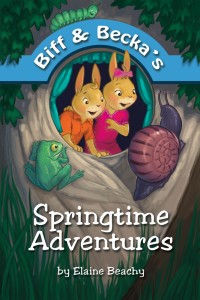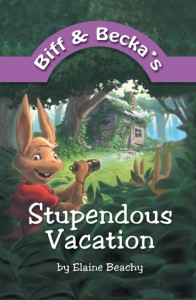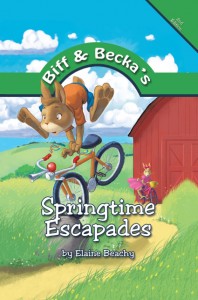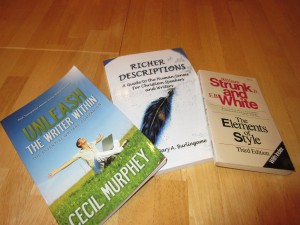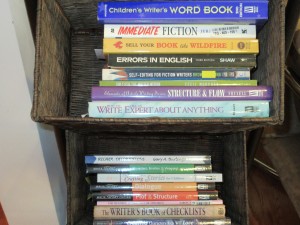Monthly Archives: August 2015
In the late 1990’s when my grand kids were small, I wrote a story for them about two rabbits titled “Biff and Becka Go to Town,” and they enjoyed it. I tucked those few typed pages away and forgot about them. In the fall of 2010, I was to meet my friend Jane for lunch, and I wanted to give her something as a token of our friendship. The thought came to give her a copy of that story for her grandchildren. She loved it, and declared I had to write more. I acquiesced, and it turned into an eight-chapter, sixty-six page book I titled Biff and Becka’s Springtime Adventures.
After contacting a few publishers, I decided to go with assisted self-publishing, did research online, and decided Wine Press Publishing looked good. So I began the submission process, and it stretched me considerably—mentally and financially. Springtime Adventures was finally published in 2012, and I had a website address elaineandfriends.com, hosted by Wine Press. I worked hard to produce a nineteen page activity packet for kids on that website, plus many other features. It was a long and arduous task.
I began work immediately on the second book, Biff and Becka’s Stupendous Vacation, and for a number of reasons, chose to change publishers. * I had it published by WestBow Press in 2013, and had a website with them at elainewrites4kids.com because it was part of that publishing package. Then I started work on the third and final book in the trilogy. Little did I know that my game plan was about to change.
In January of 2014 I learned that Wine Press Publishing was out of business, so I was left with no way to purchase any more of those books. I was really upset. It meant I had to have the book republished. But there was a silver lining behind the cloud. I would have WestBow Press republish that first book, so I’d have a matched set done by one publisher instead of two. And also, I could have my illustrator re-design a cover to represent the correct age for which my books were written: age seven to eleven. (Because of inexperience, miscommunication and other factors, the beautiful cover for Springtime Adventures had looked like it would be for kids four to five years of age.) I immediately saved all the information from my elaineandfriends.com website onto my computer, so I wouldn’t lose it, and could access it later. I was glad I acted quickly!
I changed the name from Springtime Adventures to Biff and Becka’s Springtime Escapades, wrote two more chapters which made the page count one hundred fifteen, had David Miles design a new cover, bought another publishing package from WestBow, and started over. * Since the Escapades publishing package also included a website, I decided to transfer all the website info I had saved onto my new current website ElaineBeachy.com. I let the other website expire. I was glad to finally have all my books under one “roof!”
During the middle of all this, I attended writing conferences and became a member of the Northern Virginia Christian Writer’s Fellowship for monthly meetings. I also started writing a blog in October of 2011 and kept it up; it will soon be four years. I also had a facebook author fan page. Everything really stretched me, but I am thankful my husband has been so supportive, and our oldest son has given me invaluable computer help. I did a lot of praying as I wrote, and the Lord was faithful to help me with everything.
My third and final book, Biff and Becka’s Splendiferous Christmas will be out sometime in September of this year (2015). You’ll be the first to know!
I invite you to visit my blog I write at www.elaine-beachy.blogspot.com, and become a member! I write on a variety of subjects, all of which are aimed at “turning hearts toward home,” whether physical or spiritual “home.” I’ve been writing the blog since October of 2011. I welcome your questions and comments.
If you want to write well, you have to learn to self-edit. If you’re writing a book, you will of course probably want a professional editor to give your book the once-over, but truly, you as the author know your material better than anybody, and you can learn to trust your instincts once you learn some basic rules of good writing. I mean, who wants to spend tedious hours wading through a pyramid of tomes with the hope of learning to write well? Not I. It kills inspiration and creativity, in my opinion. A few good sources will be sufficient.
C S (Susanne) Lakin, professional copy editor, writing coach and novelist from California, says when you begin editing your writing, leave your work for an hour, a day or a week, and then read it again. If anything seems awkward to you, trust that feeling. Re-write that part. It’s almost always right.
Learn to write tight. That means you cut out unnecessary words in a sentence; writing that is less wordy has more “punch.” Use exclamation marks with rarity; overuse indicates an amateur writer.
I was blessed to be able to attend the Greater Philadelphia Christian Writer’s Conference several years ago. One speaker I found especially fascinating was Gary Burlingame, a researcher and international lecturer on the use of human senses. I bought his book at the conference, and I highly recommend each writer have one. It’s titled “Richer Descriptions, a Guide to the Human Senses for Christian Speakers and Writers.” Even though he gives scientific information (which you can ignore if you’re not into science), he gives examples in simple box sections throughout the book. Scientists today define nine senses—not just five: smell, taste, touch, hot/cold, pain, hearing, sight, balance, and body awareness. Gary shows how including sensory expressions in your writing makes it come alive. For example, he literally names sounds from A to Z.
Cecil Murphy was another speaker I was blessed to learn about at the writer’s conference in Philly. He says, “Who you are determines what you write.” I bought his book too, which I highly recommend: “Unleash the Writer Within: the Essential Writer’s Companion.” His book is crucial to you as a writer, for he says, “We need to continue improving our writing skills, but in the process, we can’t forget who we are. If we do, our voices become lifeless. The words may sound beautiful, but they won’t express or true selves.”
The third book is indispensable when it comes to actual writing. Every writer needs “The Elements of Style” by William Strunk, Jr., and E.B. White. Don’t let the small size fool you; it packs a wallop with essential rules of word usage, punctuation and more. A thesaurus is also helpful for expanding vocabulary and adding interest to your writing.
There are good websites that will educate you, such as writetodone.com.Also, Marlene Bagnull, director of the Greater Philadelphia Christian Writer’s Conference, offers CD’s of speakers from her conference for only $6.00 at writehisanswer.com. One CD I purchased was by Carrie Turansky titled “Self-Editing – Flipping the Switch.” I took notes on it and spoke about it at my local Christian Writer’s Group, Northern Virginia Christian Writer’s Fellowship. This summer I purchased Bethel TV Writer’s Workshop online, and I look forward to finish watching it soon. There are many resources available for writers, but these few are the ones I have used.
You owe it to yourself to be involved in a good Christian writer’s group. Don’t live near one? Find some other writer friends or acquaintances, and start one!
Next to knowing what to write about and where to begin (which we discussed earlier), finding time to write can be a challenge. Sometimes, we as nice people become a yes person to anyone who wants something from us. We must learn when to say ‘no’ so we can make time for ourselves, too. When we make commitments that we find hard-pressed to keep, life can get too busy, noisy and very frustrating, resulting in angry feelings. But if you’re a writer, the feeling that you want to write something won’t go away.
I’ve done my biggest blocks of writing my children’s books when my husband and I went away for a few days to Cacapon State Park in West Virginia. Leaving phones and schedules behind, we drove to a parking area near a woods, and parked the car, listening to the birds and sounds of nature around us. Since it was chilly, we just sat quietly in the car with the doors open; Dave read a book while I pulled out my notebook and began to plot my story. And ideas flowed.
Other times at home, leaving the phone inside, I had a mini “vacation” by sitting on my back deck with a glass of ice water when the weather was balmy. There’s something about being in nature that inspires me to write. This is especially true when I write poetry. I love looking at the trees and blue sky, watching birds flit about, listening to the sounds of a distant neighbor’s lawnmower, or squeals of children at play.
I enjoy writing at night when the house is quiet and the black darkness outside coats the windows like a blanket wrapped around me in solitude, and I sip the spicy sweetness of a cup of decaf Chai tea. Like now. Can you smell it?
On trips to Pennsylvania to visit family, I take a notebook along in the car and jot down notes and ideas for a blog article or poem as my husband drives.
Sometimes life gets in the way of the best-laid plans, and your coveted writing time seems elusive.
• Don’t over-commit to activities
• Take a vacation from schedules
• Plan errands carefully
• Spend less time on the phone
• Curtail social media time (that’s a big one!)
Ask the Holy Spirit to help you carve out enough time for you to write. Then just do it!
Next time: Writing well and self-editing tips
Writing involves a lot of orderly thinking and organization, and it can seem like a daunting task to produce writing that flows. When I timidly began my first children’s book (I had no training whatsoever), I used 3 x 5 cards to write down scenes or ideas I wanted to incorporate into my book, and spread them out on the kitchen table. Then I rearranged them as I added other ideas in an orderly sequence of events. I now do this on a computer, but that was how I chose to begin writing because the computer kind of intimidated me at first.
At the computer, I keep college-ruled notebooks handy: one for blog articles and poetry, and another one for WestBow Press, and one for each book I write. This is useful for writing down pertinent information, and kind of an outline of what I want to include in the book or blog article. You may want to use different colors of ink to break up eye monotony and distinguish between ideas.
When I wrote my children’s books, I used my imagination to ask, “What could/would/should happen next?” I kept, and still keep, several notebooks at my computer to write some notes and ideas long-hand. There’s something to be said, I think, for allowing the brain to transfer thoughts to flow through your hand and fingers, through a pencil, and onto paper, shaping the letters yourself. When I typed it out on the computer, I used the copy and paste method to transfer paragraphs if necessary, rearranged the story line several times, and kept at it until I completed it to my satisfaction. I do the same thing when I write a blog piece or a long, detailed e-mail.
Speaking of e-mails, they are a good place to practice your sentence structure, spelling, and grammar. Yes, writer’s do need to learn all of those, but when the creative juices are flowing, don’t stop to correct anything. Just write with passion. Lay it out there, line after line. You can always edit your work later.
Keep a notepad and pencil beside your bed, or on your person when out and about. Ideas may come to you when you least expect them, and unless you write them down, you’ll lose them. Sometimes I even grab a sticky note at my desk or when I’m cooking or baking in the kitchen, and scribble thoughts that come to me. Inspired ideas are priceless!
Some writers keep file folders of news clippings, magazine articles, or personal notes for each subject that interests them. Then, when they want to write on a specific subject, they draw ideas from that file. I’ve never done that, but I do have a filing system for stories which include research, marketing and sales ideas. For example, when I wrote “Biff and Becka’s Stupendous Vacation,” I did a lot of research, including Splashdown Water Park, Manassas Airport and aviation, baseball teams, Dulles Air and Space Museum, and Sully Plantation (which I also visited in person).
Knowing where or how to start writing can feel overwhelming—even if it’s just a magazine article or a letter to the newspaper editor. You may think, “Who would ever want to read what I have to say? I’m not good enough. Other writers are much better than I.” But that kind of thinking will squash the gift or calling you feel inside of you. Reject those kinds of thoughts. You have something to offer the world, especially if your desire is to please God with your writing. If you have a desire to write, I believe God placed that desire inside you; but that inspiration has to be nurtured and encouraged, and exposed to training in the writing craft. I had to come to the place in writing my children’s trilogy where I decided I need to write for an audience of One: God. Writing to please others is counterproductive; you need to be true to yourself.
Often those who would like to write say, “I just can’t seem to find the time to write!” Perhaps it’s not so much a matter of not finding time than it is to know how to get started, or how to proceed. We will discuss the “time” issue in another post.
I think every serious writer has had all those thoughts at one time or another. Much of writing is thinking, and then organizing those thoughts into a cohesive work.
Before you begin putting pen to paper, or fingers to the keyboard, ask yourself some questions. Why do you want to write? What is your area of interest, your motivation? Do you want to inspire and instill spiritual truths? Do you want to write fiction or non-fiction? Poetry? Humor and satire? Screenplays for movies or TV sitcoms? (We need Christian writers in that field!) What do you want to do with your writing? Put it in a book, send letters to the editor of newspapers, or submit magazine articles? Maybe you want to start a blog where you can write about topics that interest you. With the click of the computer mouse, you’re published! This is often a good place to start as you practice your writing. Or maybe you want to write a memoir as a legacy to your children and grandchildren.
Be honest and look inside your heart. What inspires you? What do you know that may help someone else? What is your passion? One word of caution: if your desire is to make a lot of money selling books or make a name for yourself, don’t write.
I’ve always liked to write. I have notebooks half-filled with sermons, journals, a book of unpublished poetry, Bible studies I’ve written and taught. I’ve written a song or two, and also write e-mails or send cards by snail mail to encourage people. I’ve published two children’s books and my third one is about to be released. I’ve started working on a cookbook. Sometime I want to write my memoirs and perhaps a booklet about my experience with clinical anxiety-based depression.
Writing is therapeutic for me when I know I can help and encourage someone. In the summer of 2008 I felt called of God to write books for children, but had no training in writing. I stepped out in faith and began writing my Biff and Becka children’s trilogy. I believe kids need to be given good, solid reading material that will help shape their thinking for a lifetime. Some parents have told me the books help them in parenting.
It’s a passion of mine to speak up and defend the truth of God’s Word in living the Christian life, in moral, social, and political issues of the day. I passionately desire that people will make Jesus Christ the Lord of their lives and love the Lord their God, their Creator. To love God is to hate evil, Scripture says. It’s a passion of mine to encourage friends and family to stay on the “straight and narrow” way that leads to life. It’s a passion of mine to pray as well.
We live in a heart-rending day when our culture says good is evil, and evil is good (Isaiah 5:20). I am passionate about warning against that kind of thinking. There’s a fire in my belly to stand for truth and righteousness.
I am a teacher with a pastor’s heart. That’s the reason I write. Others may stand in a pulpit or on a street corner and preach. I am not a gifted or fluent speaker, because I fight the tendency to stutter when I talk. Others may have a ministry in singing, or whatever. But I feel fulfilled when I write something I feel is worthwhile. If I don’t write for a day or two, I get the “itch” to write.
So. You say you want to write. Thanks to my friend Dennis Burton who posted on my facebook author page, “Teach me how to write,” I plan to write some posts about my journey in writing, and share some tips that may help you in your journey as well.
 Elaine’s Place
Elaine’s Place
- Discerning God's VoiceNormal 0 false false false EN-US X-NONE X-NONE /* Style Definitions */ table.MsoNormalTable {mso-style-name:"Table Normal"; mso-tstyle-rowband-size:0; mso-tstyle-colband-size:0; mso-style-noshow:yes; mso-style-priority:99; mso-style-parent:""; mso-padding-alt:0in 5.4pt 0in 5.4pt; mso-para-margin-top:0in; mso-para-margin-right:0in; mso-para-margin-bottom:8.0pt; mso-para-margin-left:0in; line-height:107%; mso-pagination:widow-orphan; font-size:12.0pt; mso-bidi-font-size:11.0pt; font-family:"Times New Roman",serif; mso-bidi-font-family:"Times New Roman"; mso-bidi-theme-font:minor-bidi;} "Come to Me, all you who labor and are heavy-laden and overburdened, and I will cause […]
- Encourage Yourself in the LordI am praying in faith every time I ask God for something, and then thank Him for granting my request! I continue to ask with thanksgiving, standing on the Word of God—His promises of healing, provision, restored relationships, etc. See it as done through the eye of faith. Imagine it done, and praise and […]
- My Journey to becoming A Published AuthorNormal 0 false false false EN-US X-NONE X-NONE /* Style Definitions */ table.MsoNormalTable {mso-style-name:"Table Normal"; mso-tstyle-rowband-size:0; mso-tstyle-colband-size:0; mso-style-noshow:yes; mso-style-priority:99; mso-style-parent:""; mso-padding-alt:0in 5.4pt 0in 5.4pt; mso-para-margin-top:0in; mso-para-margin-right:0in; mso-para-margin-bottom:8.0pt; mso-para-margin-left:0in; line-height:107%; mso-pagination:widow-orphan; font-size:12.0pt; mso-bidi-font-size:11.0pt; font-family:"Times New Roman",serif; mso-bidi-font-family:"Times New Roman"; mso-bidi-theme-font:minor-bidi;} We lived on Yorkshire Lane in Manassas, VA, and the year was 1991. One day I […]
- Our ConstitutionIt is amazing to me that in one hand I can hold such a weighty document as the Constitution of the United States -- not hundreds or even thousands of pages, as some documents of law today. The small booklet, available from The Heritage Foundation, consists of only forty-some pages, is 3 1/2" wide and […]
- Matters of the HeartNormal 0 false false false EN-US X-NONE X-NONE /* Style Definitions */ table.MsoNormalTable {mso-style-name:"Table Normal"; mso-tstyle-rowband-size:0; mso-tstyle-colband-size:0; mso-style-noshow:yes; mso-style-priority:99; mso-style-parent:""; mso-padding-alt:0in 5.4pt 0in 5.4pt; mso-para-margin-top:0in; mso-para-margin-right:0in; mso-para-margin-bottom:8.0pt; mso-para-margin-left:0in; line-height:107%; mso-pagination:widow-orphan; font-size:11.0pt; font-family:"Calibri",sans-serif; mso-ascii-font-family:Calibri; mso-ascii-theme-font:minor-latin; mso-hansi-font-family:Calibri; mso-hansi-theme-font:minor-latin; mso-bidi-font-family:"Times New Roman"; mso-bidi-theme-font:minor-bidi;} “What’s happening in this country today is beyond anything we’ve ever seen in American politics. […]
- God is Good; the Devil is BadNormal 0 false false false EN-US X-NONE X-NONE /* Style Definitions */ table.MsoNormalTable {mso-style-name:"Table Normal"; mso-tstyle-rowband-size:0; mso-tstyle-colband-size:0; mso-style-noshow:yes; mso-style-priority:99; mso-style-parent:""; mso-padding-alt:0in 5.4pt 0in 5.4pt; mso-para-margin-top:0in; mso-para-margin-right:0in; mso-para-margin-bottom:8.0pt; mso-para-margin-left:0in; line-height:107%; mso-pagination:widow-orphan; font-size:11.0pt; font-family:"Calibri",sans-serif; mso-ascii-font-family:Calibri; mso-ascii-theme-font:minor-latin; mso-hansi-font-family:Calibri; mso-hansi-theme-font:minor-latin; mso-bidi-font-family:"Times New Roman"; mso-bidi-theme-font:minor-bidi;} “Every good gift and every perfect gift is from above, and comes down from the […]
- The Dominion of BlessingNormal 0 false false false EN-US X-NONE X-NONE /* Style Definitions */ table.MsoNormalTable {mso-style-name:"Table Normal"; mso-tstyle-rowband-size:0; mso-tstyle-colband-size:0; mso-style-noshow:yes; mso-style-priority:99; mso-style-parent:""; mso-padding-alt:0in 5.4pt 0in 5.4pt; mso-para-margin-top:0in; mso-para-margin-right:0in; mso-para-margin-bottom:8.0pt; mso-para-margin-left:0in; line-height:107%; mso-pagination:widow-orphan; font-size:11.0pt; font-family:"Calibri",sans-serif; mso-ascii-font-family:Calibri; mso-ascii-theme-font:minor-latin; mso-hansi-font-family:Calibri; mso-hansi-theme-font:minor-latin; mso-bidi-font-family:"Times New Roman"; mso-bidi-theme-font:minor-bidi;} Few things are more painful to the human heart than strained or severed relationships. Because […]
- Be StillRadio and TV stations are filled with so many voices that clamor for our attention. Riots, terrorism, sex trafficking, drug trade, political intrigue, snarky behavior, betrayal, obstruction of truth, violence, and injustice, threaten to overwhelm our nation and the world. Satan's gripping tentacles of moral decay seem to have made inroads everywhere -- in the […]
- A Family RestoredNight and day among the tombs and on the mountainsides, the tormented man shrieked and screamed and cut himself with stones. (Thought: stones can represent the Law.) Jesus came and gave him grace. "Come out of the man, you unclean spirit!" Jesus commanded of the unclean spirit residing in the pitiful man who made his […]
- Mothers and Mental Sound TracksI share the following free verse poem I wrote in 1994 during a time of personal struggle as a mother of teenagers; may God use it to encourage you. I hate the fact That I feel the need To be assured About my child's spiritual health. I play fears from the sound track Of my […]
Recent Posts
Recent Comments
- gitaraHON on Elaine’s Place
- porady-brel on Elaine’s Place
- ChesterAcure on Elaine’s Place
- Unilokshina on Elaine’s Place
- JeffreyQuere on Elaine’s Place


